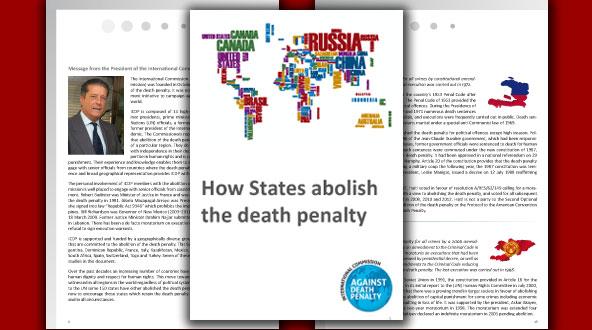
Study explores variety of national paths to abolition
Abolition
The brief history of abolition in 12 countries and two US states published on 15 April 2013 by the International Commission against the Death Penalty (ICDP) shows that there is no single path to end capital punishment and identifies a variety of options for countries that still use the death penalty.
While some states moved very quickly from carrying out executions to enshrining abolition in their constitution, others took gradual steps such as a moratorium on death sentences and executions, the reduction of the scope of the death penalty or the progressive adoption of international law instruments.
Political leadership
In most cases, the authors found that “abolition of the death penalty requires political leadership”, which is “very important in overcoming national opposition”.
This is illustrated by the chapter on abolition in France, where then president François Mitterrand and justice minister Robert Badinter led the Parliament to vote overwhelmingly in favour of abolition in 1981 while “60-65% of the French people favoured capital punishment”.
Among those leaders who steered their state towards abolition, the report found increasing evidence that the risk of using capital punishment against innocent people was a key argument. “The execution of an innocent person stands as anathema to our very sensibilities as human beings,” former New Mexico governor Bill Richardson, now a member of ICADP, said after repealing the death penalty in his state in 2009.
Mongolian president Tsakhiagiin Elbegdorj is another illustration of strong political leadership in favour of abolition. After his election in 2009, he began to commute all sentences, then imposed a formal moratorium on the death penalty. Yet president Elbegdorj’s example also shows that international law can be a useful tool to national leaders: in 2012, Mongolia abolished the death penalty by acceding to the UN Protocol on the death penalty – an easier path than reforming national legislation, which is not complete to this day.
“Marking a break with a repressive past”
The study also found that abolition “is often associated with marking a break with a repressive past, as happened at the end of apartheid in South Africa, the end of the Duvalier regime in Haiti, the aftermath of the genocide in Rwanda and a ceasefire and peace agreement after massive human rights violations in Cambodia”.
The ICDP’s analysis of the role played by various actors including government officials, the courts, the media, professional organisations, religious bodies and NGOs concluded that “opposition to the death penalty is not exclusive to any particular region, political system, world religion, culture or tradition”. For example, “once free of colonisation, traditional values about the sanctity of life in some African cultures influenced developments against the death penalty in countries such as Senegal and South Africa”.
The report contains many other examples obtained by researchers from a wide array of sources. “In February 2013, ICDP organised a meeting of experts in Geneva to discuss steps states can take towards abolition of the death penalty. That meeting brought tougher death penalty experts from academia, intergovernmental organisations and non-governmental organisations and the discussion informed this document on how states abolish the death penalty,” said ICDP president Federico Mayor.
The authors now hope that the report will help retentionist countries find their own path to abolition. “The purpose of this publication is to give examples of how governments have proceeded in abolishing capital punishment and to provide lessons learned for states considering such a move. The aim has been to provide sound, practical and relevant steps that will inspire states to abolish the death penalty,” Norwegian foreign affairs minister Espen Barth Eide wrote in the report’s foreword.






